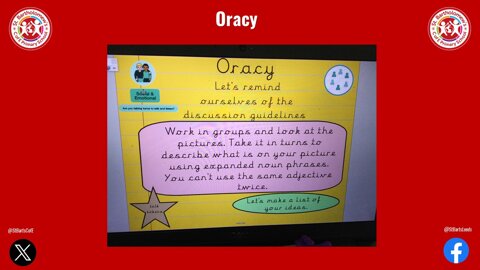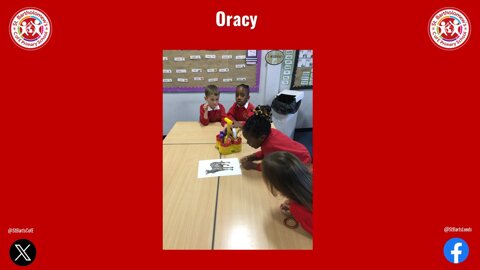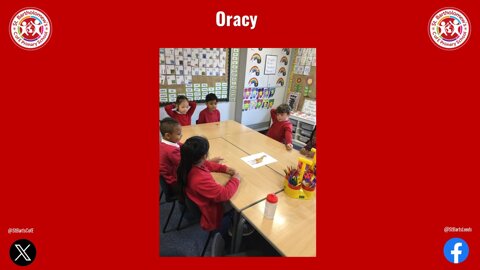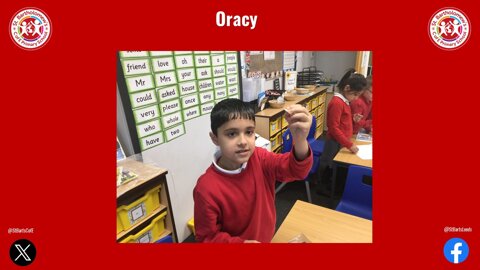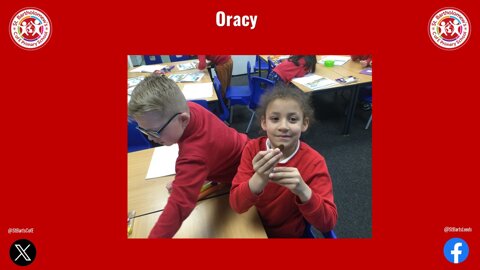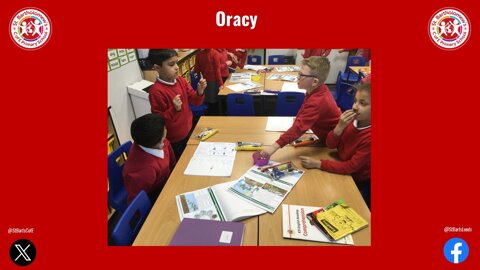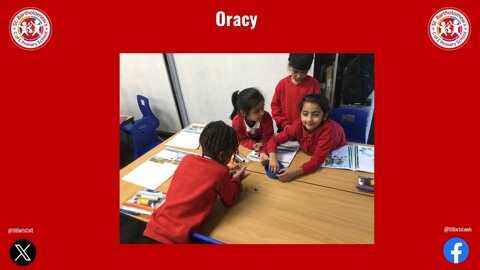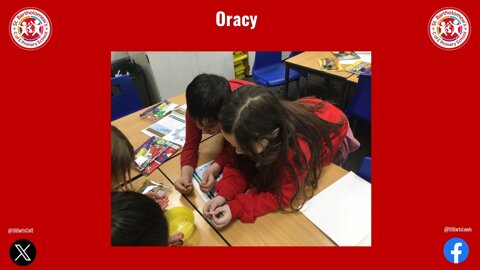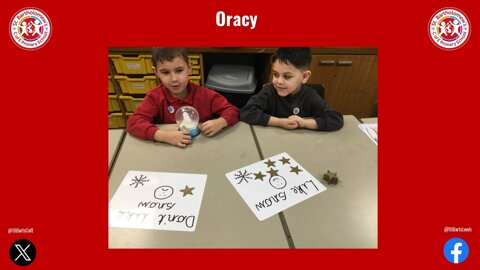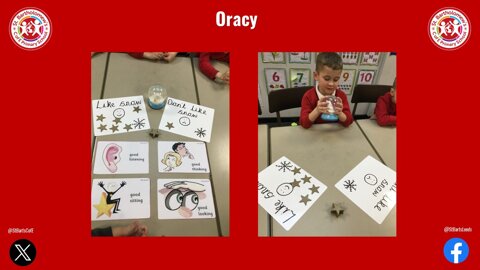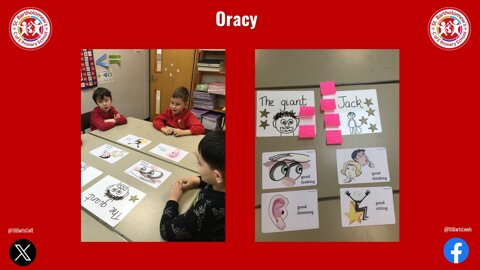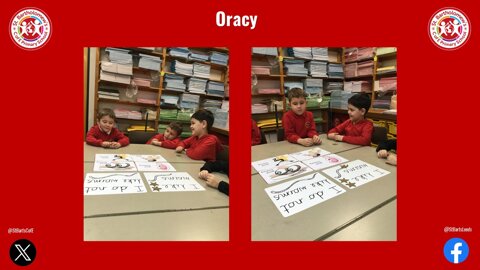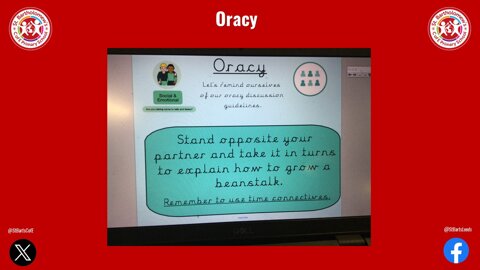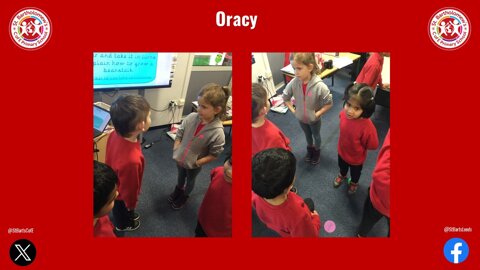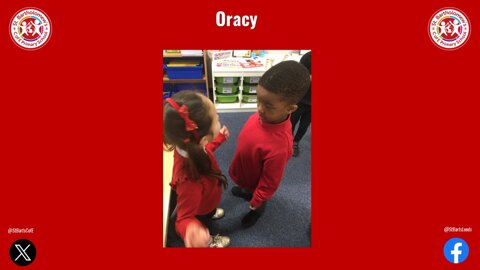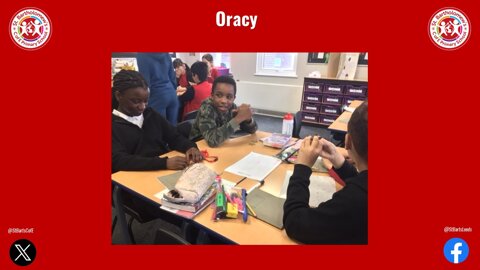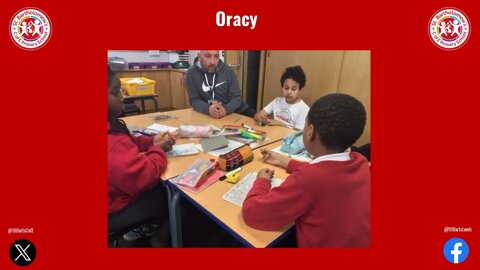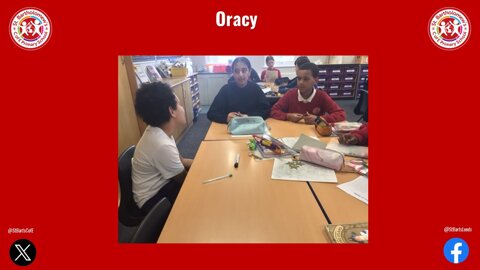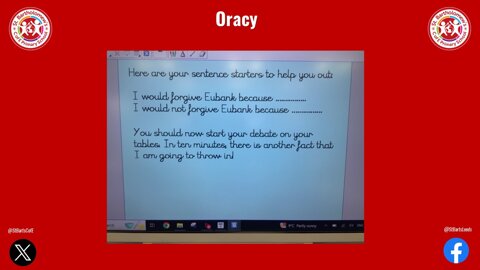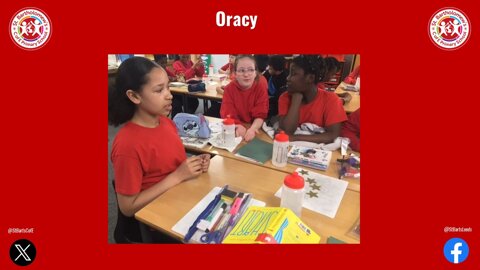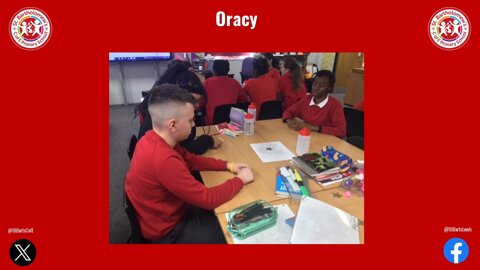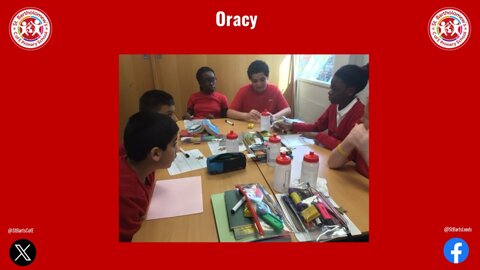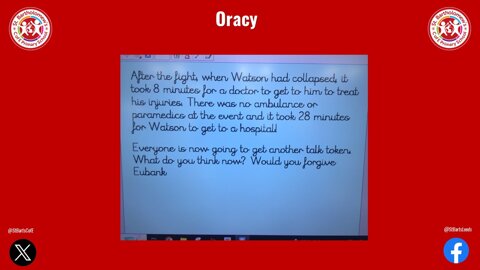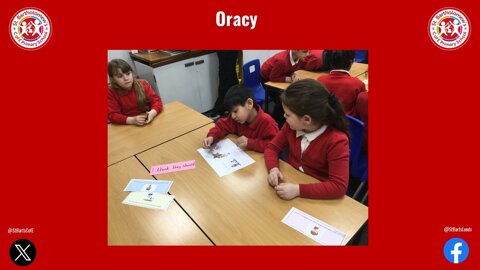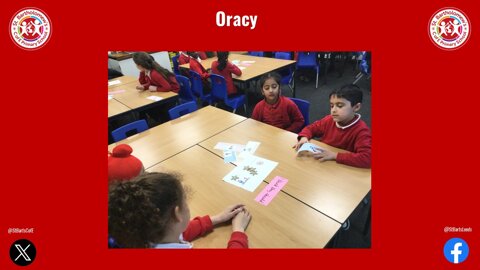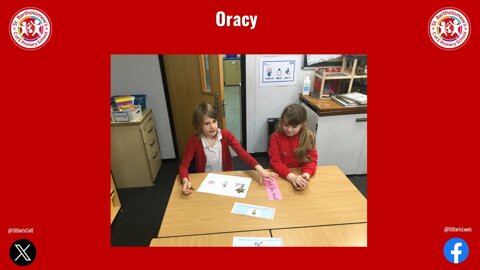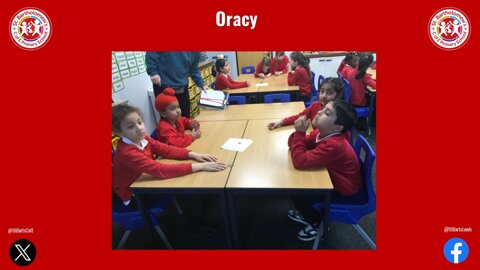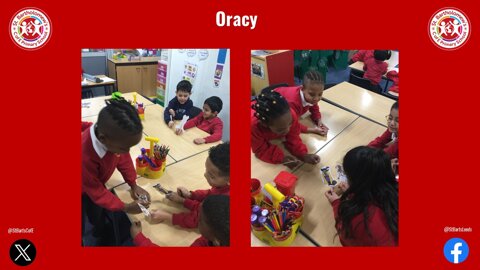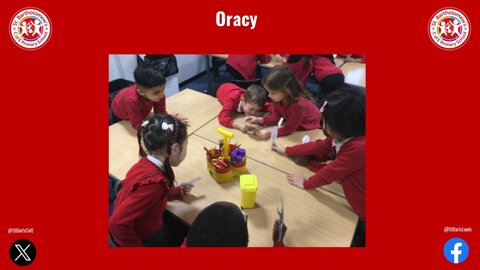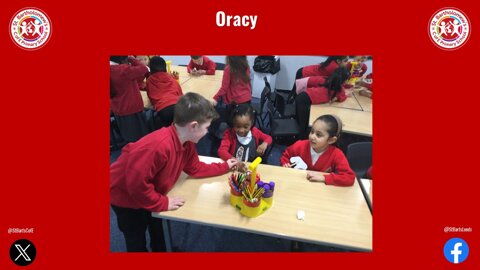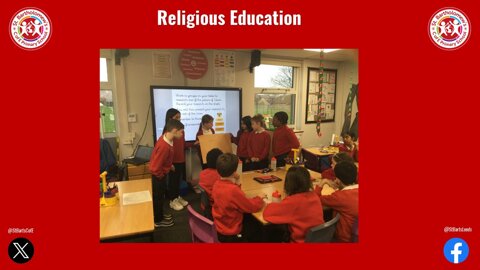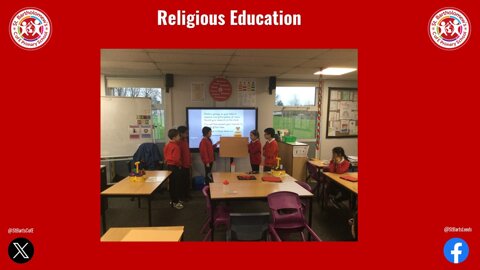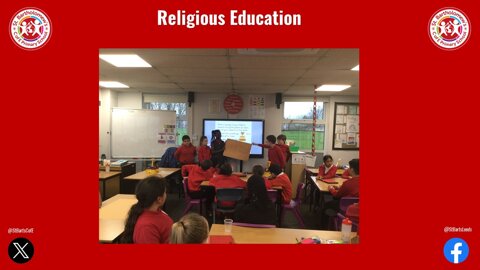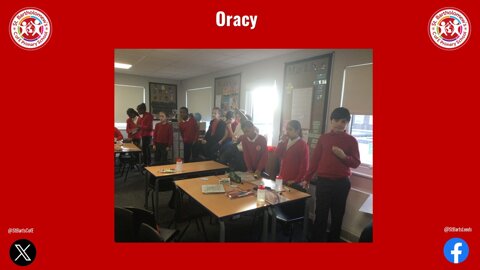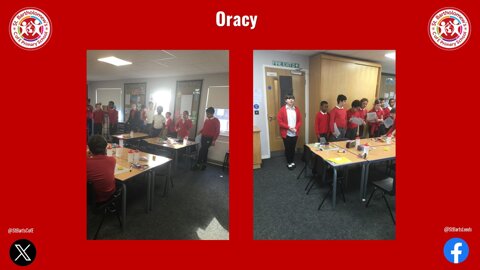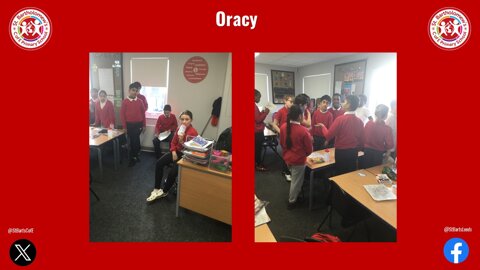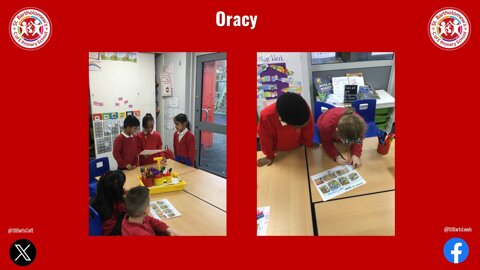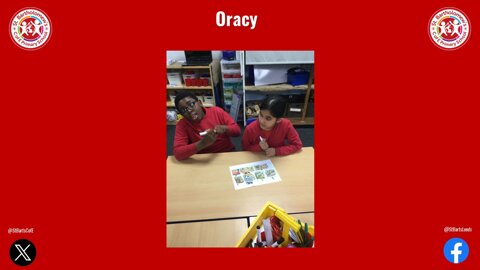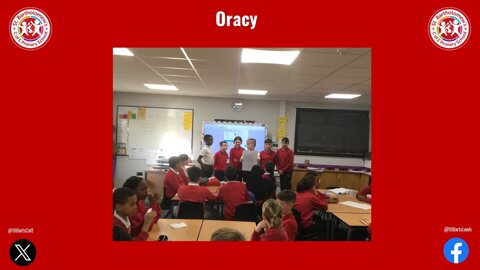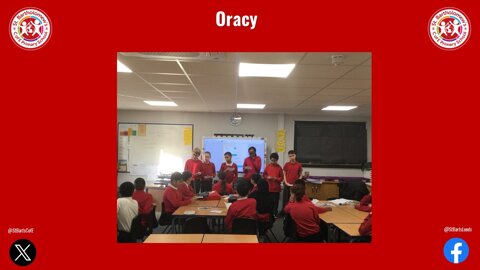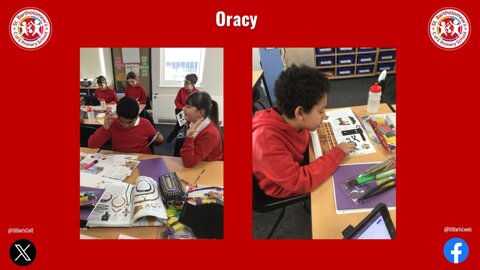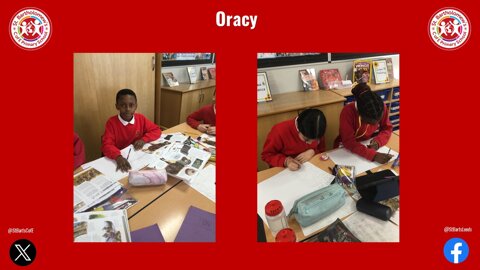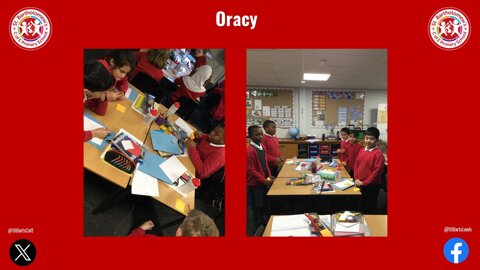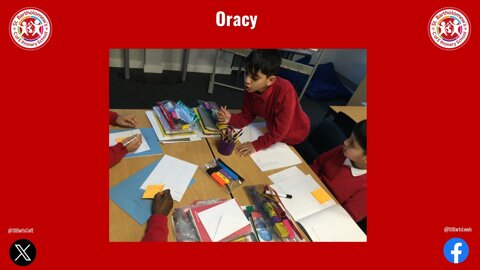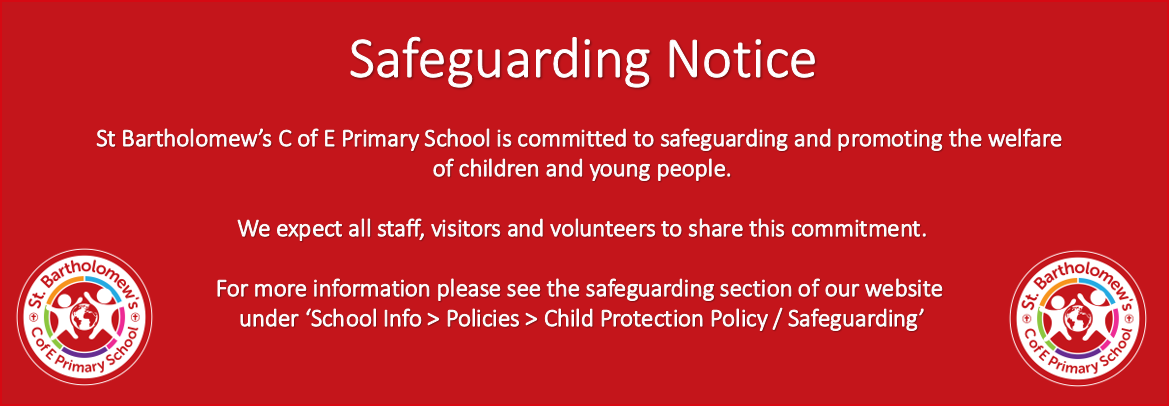Oracy is the ability to articulate ideas, develop understanding and engage with others through spoken language. In school oracy is a powerful teaching tool for learning: by teaching children to become more effective speakers and listeners we empower them to better understand themselves, each other and the world around them.
At St Bart’s we:
- Set high expectations for oracy
- Value every voice
- Teach oracy explicitly
- Use oracy to elevate learning
- Appraise progress in oracy
At St Bart’s we ensure children receive at least one explicitly taught oracy lesson each week across a range of different subject areas. Our teachers ensure children have the opportunity to see what effective speaking looks like for a range of different purposes.
Research shows that there are multiple benefits from embedding high quality oracy education in our school. Developing effective speaking and listening skills in our children will:
- Increase confidence
- Improve academic outcomes
- Foster wellbeing
- Equip them to thrive in life beyond school
Voice 21
The school is part of the Voice 21 national network of schools. We work in partnership towards a shared vision to transform the learning and life chances of children through talk, so that they can use their voice for success in school and in life.
Curriculum - Oracy - Expanded Nouns
In oracy, we have been using expanded nouns to describe the different animals that appear in our class book Handa's Surprise.
Curriculum - Oracy - Pharaohs (Class 9)
In class 9 we have started a new topic about ancient Egypt. This week we were using our oracy skills and answering the question - Who was 5he greatest pharaoh in ancient Egypt?
Curriculum - Oracy - Pharaohs (Class 10)
Class 10 have worked in trios to investigate who the greatest pharaoh was. First, we were given information to read about three different pharaohs. Then, we used our oracy skills to discuss. One person in each group shared their opinion with the rest of their group and explained why. Then, the second person used sentence stems to say whether they agreed, and gave evidence to either add to the first person's point or disagree. Person three then summarised what the other two people had said. We then swapped roles. We really enjoyed using our oracy skills to investigate!
Curriculum - Oracy - Studying Seeds
Our science lesson had an oracy focus this week! We worked in groups to study a variety of seeds before asking questions we would like answering throughout our new topic of Plants, such as "how much water does a seed need?", "how long does a seed take to grow?" and "can a seed grow without soil?"
Curriculum - Oracy - Small Group Work
Some of the children in year 1 have been practicing their oracy skills in a small group. We discuss the important aspects of speaking and listening, including looking at the speaker, taking turns to talk and thinking about what we are going to say.
Curriculum - Oracy - Listening Skills
In oracy we worked in pairs to give instructions on how to grow a beanstalk. We had to listen very carefully to our partner, so we knew what step came next.
Curriculum - Oracy - Forgiveness
Classes 16 and 17 looked at forgiveness and completed an Oracy lesson on whether Michael Watson should forgive Chris Eubank. Children used talk tokens to discuss the aftermath of the fight and how good things came from the fight, such as Watson and Eubank becoming friends and how safety improved for boxers at boxing events.
Curriculum - Oracy - Class Debate
Check out class 13’s debate.
Curriculum - Oracy - Medicine
In class 6, we had an oracy session in PSHE. We were learning all about who should give us medicine, and worked in groups to discuss different scenarios. We focused on the Linguistic strand, giving reasons why we had different ideas. We used talk tokens to make sure everyone had the chance to share their ideas.
Curriculum - Oracy - Jack & The Beanstalk
In our oracy session, we worked in groups to retell the story of Jack and the Beanstalk using stick puppets.
Curriculum - Oracy - Electric Car Discussion
Class 13 have debated, ‘Are electric cars better for the environment?’ in groups using their oracy skills and scientific knowledge. Check out the debates.
Curriculum - Oracy - The 5 Pillars of Islam
This week in RE we have looked at the 5 pillars of Islam. The children worked in groups to research a pillar and presented their findings to the class.
Curriculum - Oracy - Sustainability Discussion
Class 13 have debated, ‘Are metals sustainable?’ in groups using their oracy skills and scientific knowledge. Check out their debates.
Curriculum - Oracy - Greenland
This week in Geography, class 16 have learnt all about Greenland and how climate change is having an impact on the land and the people there. We looked at 2 case studies: one person who was happy about the effects that climate change was having and 1 person who was not happy. Children had to decide who they agreed with. We then had a debate using our oracy strands and sentence stems.
Curriculum - Oracy - The Importance of Rules
This half term in R.E we have discussed rules and the importance of rules. Today we discussed why we have rules and what can happen if those rules are broken. A lot of the children explained that people can get hurt or upset. We showed the importance of rules through drama. We focused on the physical strand of the the framework and made sure our voices were loud and clear.
Curriculum - Oracy - Reader Leaders Class Visit
Class 5 enjoyed their visit from the reader leaders today. They read the ugly five and class 5 loved it. Thank you year 6!
Curriculum - Oracy - The Kindest Red
Children in year 1 and year 2 have been reading the story The Kindest Red. They have thought about kindness and have worked together to organise different words associated with being kind. They focused on the Social and Emotional strand of the Oracy Framework and worked hard to take turns to contribute. They used stem sentences such as 'I think this word means ....... because......' to articulate their ideas. Class 4 worked together to write a class poem about kindness.
Curriculum - Oracy - Build, Challenge, Clarify
Year 6 children in class 15 spent time developing their oracy skills - using build, challenge and clarify. Children had to discuss different scenarios and how people would feel.
Curriculum - Oracy - Breaking Rules
Class 6's RE lesson this week had an oracy focus. We were working on the physical aspect of the oracy framework, focusing on making sure our voices are loud enough to be heard. We created mini performances about somebody breaking a rule, then discussed what would be different if we had a positive role model to show us how to make the right choices.
Curriculum - Oracy - Animals & The Food Chain
In science we worked in partners to identify the different animals in the food chain. We then used the sentence stem to explain the food chain.
Curriculum - Oracy - Gas and Weight
In science this week, we investigated whether gas weighs anything. We shared our ideas giving examples from previous investigations, life experiences and our own knowledge. Then we weighed a bottle of fizzy water. We discussed what happens when you shake fizzy drinks before opening. We then did exactly that! We could hear the gas escaping and when we weighed it, the bottle of water weighed less. This proved that the gas must have weighed something when it was in the bottle. We discussed what we had observed and used reasons to back up our ideas.
Curriculum - Oracy - Stone Age Artefacts
Class 11 have used their oracy skills to explore different real life Stone Age artefacts. They thought about what they were, what it was used for and what it was made from. We discovered there was a spindle Whorl to help when twisting fibres together to make cloth, a flint hand axe from over a million years ago, a Stone Age axe that would have been attached to a wooden handle from around 5000 years ago, a bronze axe head from around 2700-4500 years ago and a small piece of flint probably used for cleaning animal skin to make leather from between 10,500 and 4000 years ago.
It was fascinating to be touching and looking at pieces of Stone Age history.
Curriculum - Oracy - Toby and The Great Fire of London
In year 2 we are reading the story Toby and The Great Fire of London. Today we ordered the story so far and retold it in our own words. We worked on the social and emotional strand of the Oracy framework and made sure we took turns and worked together.
Curriculum - Oracy - Vikings
This week, year 5 and year 6 have worked in groups to produce a presentation to inform others about Viking Life. They worked in circular groups focusing on the oracy strand: social and emotional, specifically working with others. They also used the cognitive strand of summary in their presentations.
Curriculum - Oracy - Social Emotional Strands
Class 13 using traverse oracy skills to demonstrate social emotional strands.
Curriculum - Oracy - Religious Symbols
Class 11 have used their oracy skills to discuss which picture is the is odd one out when looking at religious symbols. They used talk tokens to take turns and allow everyone to have their say. They discussed different reasons for their choices calmly and respectfully, enabling them to come to a decision.
Curriculum - Oracy - Famous Scientists
Here is a video of class 13's oracy lesson on famous scientists.
Curriculum - Oracy - The Great Fire of London
This term in year two we are looking at the great fire of London. We looked at the events of the great fire of London, we then used picture promos to tell retell the story. We discussed our oracy focus for the lesson which was the physical strand of the framework and we worked really hard to make sure our voices were loud enough.
.png)
